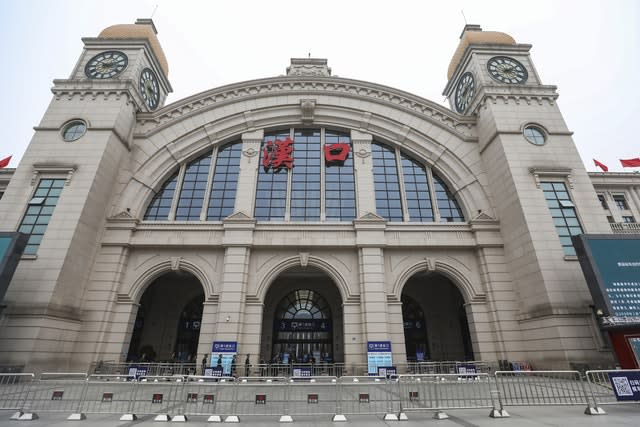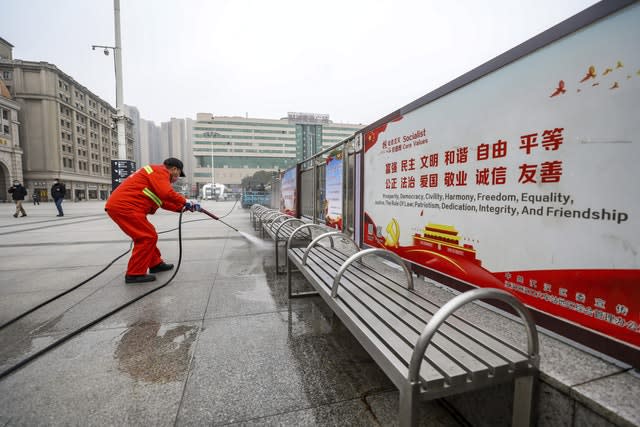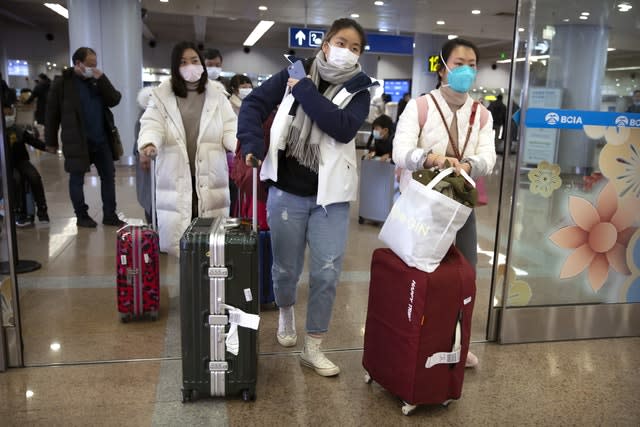China extends protective measures to contain coronavirus outbreak
Chinese authorities moved to isolate three cities that are home to more than 18 million people in an unprecedented effort to contain the deadly new virus that has sickened hundreds and spread to other parts of the world during the busy Lunar New Year travel period.
Police, Swat teams and paramilitary troops guarded Wuhan’s railway station, where metal barriers blocked the entrances at 10am.
Only travellers holding tickets for the last trains out were allowed to enter.
Normally bustling streets, shopping centres, restaurants and other public spaces in the city of 11 million people were eerily quiet.

In addition to shutting down the railway station, authorities closed the airport and halted ferry, underground and bus service.
Authorities announced similar measures would take effect on Friday in the nearby cities of Huanggang and Ezhou.
In Huanggang, theatres, internet cafes and other entertainment centres were also ordered closed.
In the capital, Beijing, authorities cancelled “major events” indefinitely, including traditional temple fairs that are a staple of holiday celebrations, in order to “execute epidemic prevention and control”.
“To my knowledge, trying to contain a city of 11 million people is new to science,” Gauden Galea, the World Health Organisation’s representative in China, said in an interview.
“It has not been tried before as a public health measure.

“We cannot at this stage say it will or it will not work.”
The illnesses from the newly identified coronavirus first appeared last month in Wuhan, an industrial and transportation hub in central China’s Hubei province.
The vast majority of mainland China’s more than 570 cases have been in the city.
Other cases have been reported in the US, Japan, South Korea and Thailand.
Singapore and Hong Kong reported their first cases on Thursday.

Most illnesses outside China involve people who were from Wuhan or had recently travelled there.
Seventeen people have died, all of them in and around Wuhan.
The oldest was 89, the youngest 48.
Images from Wuhan showed long queues and empty shelves at supermarkets, as residents stocked up for what could be weeks of isolation.
That appeared to be an over-reaction, since no restrictions were placed on trucks carrying supplies into the city, although many Chinese have strong memories of shortages in the years before the country’s recent economic boom.
Such sweeping measures are typical of China’s authoritarian communist government, though the effectiveness of a lockdown against the outbreak remains uncertain.
Local authorities in Wuhan demanded all residents wear masks in public places and urged government staff to wear them at work and shopkeepers to post signs for their visitors, Xinhua news agency reported.
Xinhua quoted the city’s anti-virus task force as saying the measures were taken in an attempt to “effectively cut off the virus spread, resolutely curb the outbreak and guarantee the people’s health and safety.”
Liu Haihan left Wuhan last Friday after visiting her boyfriend there.
She said everything was normal then, before human-to-human transmission of the virus was confirmed. But things had changed rapidly.
Her boyfriend “didn’t sleep much yesterday. He disinfected his house and stocked up on instant noodles,” Ms Liu said.

“He’s not really going out. If he does, he wears a mask.”
The sharp rise in illnesses comes as millions of Chinese travel for the Lunar New Year, one of the world’s largest annual migrations of people.
Chinese are expected to take an estimated three billion trips during the 40-day spike in travel.
Analysts predicted cases will continue to multiply.
“Even if (cases) are in the thousands, this would not surprise us,” the WHO’s Dr Galea said, adding, however, that the number of those infected is not an indicator of the outbreak’s severity, so long as the mortality rate remains low.
The coronavirus family includes the common cold as well as viruses that cause more serious illnesses, such as the Sars outbreak that spread from China to more than a dozen countries in 2002-03 and killed about 800 people, and Middle Eastern respiratory syndrome, or Mers, which developed from camels.
China is keen to avoid repeating mistakes with its handling of Sars.
For months, even after the illness had spread around the world, China parked patients in hotels and drove them around in ambulances to conceal the true number of cases and avoid WHO experts.
In the current outbreak, China has been credited with sharing information rapidly, and President Xi Jinping has emphasised that as a priority.
The International Health Regulations Emergency Committee on the new #coronavirus (2019-nCoV) reconvened now.
Read more about the Emergency Committee 👉https://t.co/Qtsxqkr7xi pic.twitter.com/30Q4wRIYqM
— World Health Organization (WHO) (@WHO) January 23, 2020
“Party committees, governments and relevant departments at all levels must put people’s lives and health first,” Mr Xi said on Monday.
“It is necessary to release epidemic information in a timely manner and deepen international cooperation.”
Health authorities were taking extraordinary measures to prevent additional person-to-person transmissions, placing those believed infected in plastic tubes and wheeled boxes, with air passed through filters.
The first cases in the Wuhan outbreak were connected to people who worked at or visited a seafood market, which has since been closed for an investigation.

Experts suspect that the virus was first transmitted from wild animals but that it may also be mutating.
Mutations can make it deadlier or more contagious.
The WHO planned a meeting of scientific experts on Thursday to consider whether the outbreak should be declared a global health emergency, requiring a coordinated international response.
Many countries are screening travellers from China for illness, especially those arriving from Wuhan.
North Korea has banned foreign tourists, a step it also took during the Sars outbreak and in recent years because of Ebola.
Most foreigners going to North Korea are Chinese or travel there through neighbouring China.
